We are looking for a part-time (65%), TV-L 13
Research Associate (Doctoral Candidate) (m/f/d)
for the joint project “Innovationsnetzwerk Stoffliche Altholznutzung auf regionaler Ebene (ISAR)”
Focus: „Fungal waste wood composites“
About us
The “Wood Research Munich” of the Technical University of Munich with the professorships for Wood Science, Wood Technology and Fungal Biotechnology in Wood Science promote the innovative and sustainable use of wood-based materials and products through research, teaching and development projects.
About the project
The joint project ISAR is integrated into the Germany-wide interdisciplinary forest and wood research within the REGULUS-initiative of the BMBF. ISAR aims at the development and validation of an innovation concept for the cycle-optimized, material use of waste wood in Bavaria in a trans-disciplinary approach. The results lead to a transformation roadmap, which shows optimization potentials and concrete measures for an implementation of the concept in practice as well as possibilities to apply the developed results to other regions. In this project, we aim at the identification of suitable fungi for the production of fungal wood composites made from waste wood and the development of a corresponding production process. Further important aspects of this project are the optimization of the material properties for the application in the packaging sector, the development of recycling strategies for mycelium waste wood composites, and the cooperation with an industrial partner for the scaling of the manufacturing process.
Your Qualifications
- Above-average university degree (M.Sc. or diploma) in renewable resources, material science, biology/biotechnology or other relevant subjects
- In-depth knowledge in the field of biological materials, renewable resources, or mycology
- Willingness to work in a team and together with an industry partner
Your Tasks
- Handling of the subproject: mycelium-based waste wood composites
- Development of new mycelium composites as packaging materials
- Optimization of manufacturing processes and material properties
- Development of a recycling strategy for mycelium waste wood composites
- Participation in the teaching of the unit, e.g. by student internship or thesis supervisions
What we offer
- Employment at the earliest possible date, e.g. 01.05.2023, limited for 36 months;
- Prospect of further 12-month extension subject to approval
- Payment according to TV-L E13 (65 % position)
- Place of work: TUM School of Life Sciences in Freising-Weihenstephan
- Possibility to get a PhD as well as scientific and personal development
- Interdisciplinary networking in German and international forest, wood, and fungal research
- Severely disabled applicants will be given preference in the case of otherwise essentially equal qualifica-tions. The Technical University of Munich aims to increase the proportion of women. Applications from women are therefore expressly welcomed.
Application
Please send your documents (letter of application and attachments including a letter of motivation in German or English) with the keyword "Fungal waste wood materials" until 26.02.2023 via e-mail to: bewerbung(at)hfm.tum.de
For additional information please contact Prof. Dr. J. Philipp Benz and/or Dr. Tanja Karl
Prof. Dr. Philipp Benz
Technische Universität München
TUM School of Life Sciences
Holzforschung München - Professur für Pilz-Biotechnologie in der Holzwissenschaft
Hans-Carl-von-Carlowitz-Platz 2
85354 Freising
Telefon +49 (0)8161 71-4590
benz@hfm.tum.de
Dr. Tanja Karl
Technische Universität München
TUM School of Life Sciences
Holzforschung München - Professur für Pilz-Biotechnologie in der Holzwissenschaft
Hans-Carl-von-Carlowitz-Platz 2
85354 Freising
Telefon +49 (0)8161 71-4592
karl@hfm.tum.de
![Figure 1: A) Mannheim Multihalle B) Toledo Timber gridshell in Naples[3], [4].](/fileadmin/_processed_/8/9/csm_figure_1_01_686abef519.webp)
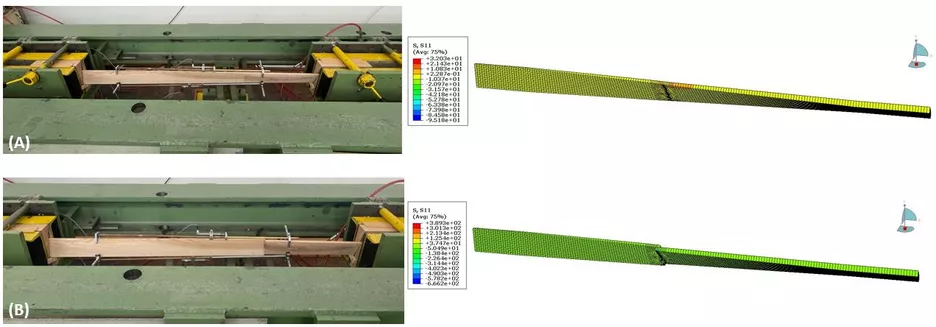
Overview:
The proposed master's thesis aims to explore the application of Timber Gridshells [1], focusing on the behavior of wooden elements subjected to a combination of torsional and tensile loading, as shown in (Figure 1). The study encompasses both experimental and numerical simulation aspects to validate its findings comprehensively. The experimental phase consists of two main parts: testing ash boards with finger joints (a subset already tested, as illustrated in Figure 2) and testing clear ash boards without finger joints with a specific focus on the impact of knots. Experimental results will undergo validation through Finite Element Modeling (FEM). A preliminary FEM model shown in (Figure 2) has been established to guide the modeling process, particularly concerning tension behavior with torsional effects in the case of finger joints [2]. However, this model requires further refinement and thorough validation against experimental data to ensure accuracy and reliability.
Tasks:
- Literature Review: Review existing research on Timber Gridshells, focusing on combined torsional and tensile loading conditions. Reviewing the previous research on modeling finger joints and their interaction properties.
- Experimental Testing: Complete testing on ash boards with finger joints. In addition, conduct experiments on clear ash boards without finger joints to study knot impact under the same loading condition.
- Numerical Simulation: Develop Abaqus models to simulate experimental scenarios and validate numerical results with the experimental data for accuracy.
- Documentation and Analysis: Document experimental procedures, results, and numerical simulations. Analyze the findings, establishing correlations between experimental and numerical data.
Apply now and submit your CV and grade report to Mostafa Abdelrahman (mostafa.abdelrahman(at)tum.de) and Ani Khaloian (sarnaghi(at)hfm.tum.de).
[1] B. D’Amico, A. Kermani, and H. Zhang, “Form finding and structural analysis of actively bent timber grid shells,” Eng. Struct., vol. 81, pp. 195–207, Dec. 2014, doi: 10.1016/j.engstruct.2014.09.043.
[2] V.-D. Tran, M. Oudjene, and P.-J. Méausoone, “FE analysis and geometrical optimization of timber beech finger-joint under bending test,” Int. J. Adhes. Adhes., vol. 52, pp. 40–47, Jul. 2014, doi: 10.1016/j.ijadhadh.2014.03.007.
[3] P. J. Cruz, Ed., “The nature of tectonic architecture and structural design,” in Structures and Architecture, 0 ed., CRC Press, 2013, pp. 266–273. doi: 10.1201/b15267-32.
[4] E. Schling, D. Hitrec, and R. Barthel, “Designing Grid Structures Using Asymptotic Curve Networks,” in Humanizing Digital Reality, K. De Rycke, C. Gengnagel, O. Baverel, J. Burry, C. Mueller, M. M. Nguyen, P. Rahm, and M. R. Thomsen, Eds., Singapore: Springer Singapore, 2018, pp. 125–140. doi: 10.1007/978-981-10-6611-5_12.
Master Thesis: Stress-strain relationship for European Ash: Influence of loading direction, strain rate, year ring width, density and moisture content
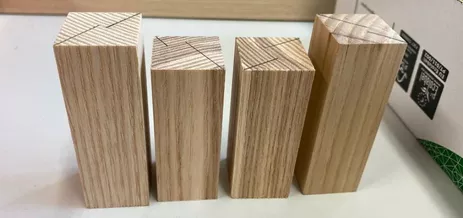
Overview:
European ash is a high-potential hardwood species with superior mechanical properties that are ideal for application in engineering wood products.[1] The proposed master thesis aims to explore the short-term mechanical properties of defect-free ash specimens, focusing on the influence of loading direction, strain rate, year ring width, density and moisture content. Ash boards of different dimensions are available at the professorship of wood technology. With these boards and a universal testing machine, the student is required to design and prepare the specimens as well as to conduct tensile and compressive tests. The obtained test results will be analysed and compared by the student to conclude on the effects of different parameters.
Tasks:
• Literature Review: Review existing research on the short-term uniaxial mechanical properties of wood. Understand why loading angles to the fibre, density, year ring width and moisture content would have an effect on the stress-strain curve (MoE and strength). Find relevant research on ash wood mechanical properties and possible applications of ash in engineering field.
• Specimen preparation: Design a test plan with detailed information such as specimen sizes, test parameter selections and the reason of your selections.
• Experimental Testing: Complete tensile and compressive testing on ash specimens according to the test plan.
• Documentation and Analysis: Document experimental procedures and results. Analyze findings, establishing correlations between experimental parameters and compare with existing studies.
Application:
Please send your CV, grade report and a reference list (list of literature you found relevant to the topic) to Changxi Yang (changxi.yang@tum.de). The starting date is flexible. A minimum presence of three days a week is required
[1] Kovryga, A., Stapel, P., & Van De Kuilen, J. W. G. (2020). Mechanical properties and their interrelationships for medium-density European hardwoods, focusing on ash and beech. Wood Material Science & Engineering, 15(5), 289–302. doi.org/10.1080/17480272.2019.1596158
![Figure 1 : A previous study involving experimental testing, analysis, and simulation of the charring rate of Laminated Veneer Lumber (LVL) panels [3].](/fileadmin/_processed_/f/7/csm_MSc_Investigating_Woods_Response_a3bf3d239f.webp)
Overview:
Wood is a widely used construction material due to its renewable nature and favorable mechanical properties. However, its thermal behavior under high temperatures, especially during fire incidents, remains a critical aspect that requires comprehensive investigation [1, 2]. This master thesis aims to study the temperature-dependent material properties of wood under elevated temperatures. By subjecting wood samples to various temperature ranges, a deeper understanding can be obtained about moisture evaporation rate in the samples and their density loss. This thesis will contain two main parts, including experimental fire tests and CT-scanning of the samples . From the CT-scanned samples, models will be developed to link the dry density of the material to the stiffness properties. In addition, algorithms will be developed to distinguish between the dry and the wet density of the wood. Figure 1 depicts a previous study involving experimental testing, analysis, and simulation of the charring rate of Laminated Veneer Lumber (LVL) panels [3].
Tasks:
- Conduct a comprehensive literature review to gather existing knowledge on the thermal properties of wood and its behavior under different temperature ranges.
- Understand the CT scanning concept and the possibilities to distinguish between the dry and the wet densities.
- Design and set up controlled experiments to subject wood samples to different temperature ranges.
- Perform CT scans on the wood samples after different temperature ranges to visualize internal material changes
- Analyze the CT scan data to quantify density loss and density variation within the wood samples due to thermal exposure.
- Come up with an approach to distinguish between the dry and the wet wood densities from the CT scans, and to assign correct material properties based on the density values.
We offer:
- Thesis in the area that is highly demanded for further industrial development.
- Equipped workspace during the thesis period.
- Supervision and support during the thesis.
- Access to different systems required for the work.
- Opportunity to publish a research paper.
Apply now and submit your CV and grade report to Mostafa Abdelrahman (mostafa.abdelrahman@tum.de) and Ani Khaloian (sarnaghi@hfm.tum.de).
[1] United States Department of Agriculture and Forest Service, Wood Handbook, Wood as Engineered Material. USA: Forest Products Laboratory, 2010.
[2] A. Frangi and M. Fontana, “Charring rates and temperature profiles of wood sections,” Fire Mater., vol. 27, no. 2, pp. 91–102, Mar. 2003, doi:
10.1002/fam.819.
[3] M. Abdelrahman, Master Thesis, Fire performance of wood steel hybrid elements: Laboratory experiments and numerical simulation. TUM School of
Engineering and Design, group of wood technology, 2022.
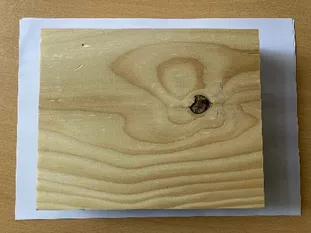
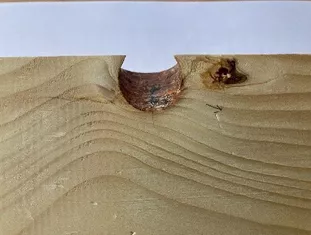
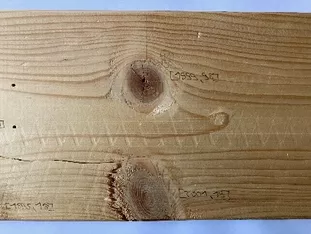
Description:
Wood is a natural fiber-based material with anisotropic and non-homogenous material properties. To better describe specific material properties of a wooden board, its fiber pattern as well as knots need to be considered. Stresses are concentrating on the location of knots and thus influence considerably the strength properties as well as the damage mechanism (initiation and propagation path) of wood. Therefore, in this Bachelorthesis, the bond, density and stiffness of knots needs to be investigated experimentally. A test setup will be developed for extracting specific material properties of knots.
Tasks:
- Literature review (knot properties, knot classification, embedding into the surrounding clear wood)
- Preparation of test specimens and arrangement of the test setup
- Planning and conducting experiments to determine the load-bearing capacities of knots and their stiffness properties
- Evaluation of experimental data
Language: English or German
Bachelor thesis available from August 2022
Supervision and further information:
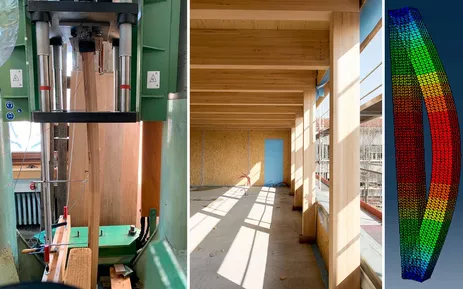
Beech (fagus sylvatica) stock in German forests is increasing [1] while the use of beech wood for construction purposes is not popular yet. Beech glued laminated timber offers high compression strength and stiffness which makes it favourable to be used in load bearing columns. Beside possible material failure due to increase in stresses, these columns may face stability issues, such as buckling as well.
Buckling behaviour of columns can be studied and be modelled by means of Finite Element method. Finite element models, in general need to be validated for their extended use in application. Experimental testing of the buckling behaviour of beech glulam columns has been performed at Holzforschung München without considering structural imperfections in single layers [2]. However, the dynamic material properties of the applied lamellas in the beech glulam are available. Dynamic properties of these lamellas exhibit a correlation with strength and stiffness properties [3]. It was also shown that material heterogeneities and imperfections are influencing the strength properties of beech lamellas. Therefore, after studying the influence of these lamella imperfections on stability of the glulam and by further developing the method for modelling of buckling, setups need to be suggested for glulam beams based on the available dynamic properties of single lamellas in this thesis. In the end, some experimental testing on beech glulam columns will be performed where dynamic properties as well as locations and sizes of the knots in the single layers are known.
Tasks of the thesis are:
- Studying of orthotropic and heterogeneous behaviour of wood and its influence on stability problems.
- Suggesting setups for beech glulam, based on the available strength and stiffness properties of single lamellas from tension tests.
- Further developing the provided approach for simulation of buckling behaviour.
- Performing small set of experiments on beech glulam columns (where the information about imperfections in single lamellas are known) for validation of the model.
Required knowledge:
- Background in modelling and simulations
Date: WS 20/21
Supervisor: Monika Zeilhofer, Ani Khaloian Sarnaghi
[1] Federal Ministry of Food and Agriculture (2015): The forests in Germany. Selected results of the third national forest inventory.
[2] Zeilhofer, M. (2019): Mechanical behaviour of beech glued laminated timber columns subjected to compression loading. Master’s Thesis, Holzforschung München.
[3] Westermayr, M.; Stapel, P.; van de Kuilen, J.W. (2018): Tensile strength and stiffness of low quality beech (Fagus sylvatica) sawn timber. WCTE.
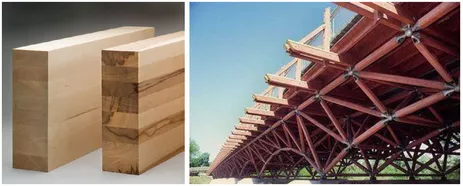
The load carrying capacity of beech glued laminated timber is regulated in the general technical approval Z-9.1-679:2014. The strength and stiffness of a member depends on the sorting class of the employed lamellas. A research project at Holzforschung München showed that beech glulam members partially manufactured from low quality beech lamellas achieve high compression and tension strength. The members in the research project were built up from lamellas specifically arranged by their dynamic Modulus of Elasticity. In practical application, the lamellas are sorted into strength classes and glulam members are constructed with randomly chosen lamellas from the sorting class. Tension and compression tests should be performed in this work in order to transform the results of the scientifically built up beech glulam members to stochastically arranged beech glulam members.
Goals and tasks
- Familiarisation with the relevant literature
- Performance of compression and tensile tests on beech glulam beams
- Evaluation of the test results
The results of the work are to be presented in an approx. 30-minute lecture at the Wood Science Seminar of the Wood Research Munich.
Date: from winter 2020
Supervision & Contact: Monika Zeilhofer

We (Benz lab, Gagneur lab) are looking for a motivated student of biology/molecular biotechnology/bioprocess engineering/biochemistry to assist in developing and carrying out a large, multi-species investigation of regulatory genomics.
The Project
Deciphering the impact of variation in non-coding regulatory regions of the genome on gene expression is a central challenge in genetics. This goal has not been achieved for any organism but important progress has been made by leveraging genome-wide omics datasets (RNA-Seq, ChIP-Seq, ATAC-Seq and quantitative proteomics, see e.g. [1]) and artificial intelligence, particularly deep learning ([2–4], see [5] for a review). A key challenge, however, is the limited amount of available sequence data with high variation, as most omics experiments are done in the same few model organisms. As such, deep learning models are only aware of a tiny fraction of the vast space of possible gene regulatory sequences.
We propose to move beyond these limitations by collecting genome-wide multi-omics data (RNA-Seq, ATAC-Seq and Mass-spectrometry based proteomics) from diverse fungal species in a variety of growth conditions. Based on these experiments, we will train a deep learning model to predict these omics observations from sequence. By jointly training on many species, our model can leverage both conservation and variation between species, to better learn the effect of individual regulatory elements on gene expression. We will use existing data, which leverages expression differences between closely related yeast strains and massively parallel reporter assays, to evaluate the model’s ability to predict the impact of sequence changes on expression [6,7]. Our ultimate goal is to crack the regulatory code of simple eukaryotes.
Your Tasks
- Growing cultures of diverse yeasts and filamentous fungi in the Benz lab
- Preparation of samples for NGS (RNA/ATAC-Seq) and Mass-spectrometry assays
-
Depending on your interest and prior programming experience, contributing to the bioinformatics processing of the data, as well as the development, implementation and evaluation of the deep learning model (Gagneur lab)
Requirements
- Currently studying biology, biochemistry or a related subject at the MSc level
- Strong interest for regulatory genomics
-
Prior experience with bioinformatics methods and machine learning is helpful, but not required
For any questions, please do not hesitate to contact us:
benz(at)hfm.tum.de (Benz) jobs-gagneurlab(at)in.tum.de (Gagneur)
- ENCODE Project Consortium. An integrated encyclopedia of DNA elements in the human genome. Nature. 2012;489: 57–74.
- Zhou J, Troyanskaya OG. Predicting effects of noncoding variants with deep learning-based sequence model. Nat Methods. 2015;12: 931–934.
- Avsec Ž, Weilert M, Shrikumar A, Krueger S, Alexandari A, Dalal K, et al. Base-resolution models of transcription-factor binding reveal soft motif syntax. Nat Genet. 2021;53: 354–366.
- Avsec Ž, Agarwal V, Visentin D, Ledsam JR, Grabska-Barwinska A, Taylor KR, et al. Effective gene expression prediction from sequence by integrating long-range interactions. Nat Methods. 2021;18: 1196–1203.
- Eraslan G, Avsec Ž, Gagneur J, Theis FJ. Deep learning: new computational modelling techniques for genomics. Nat Rev Genet. 2019;20: 389–403.
- Renganaath K, Cheung R, Day L, Kosuri S, Kruglyak L, Albert FW. Systematic identification of -regulatory variants that cause gene expression differences in a yeast cross. Elife. 2020;9. doi:10.7554/eLife.62669
- Shih C-H, Fay J. Cis-regulatory variants affect gene expression dynamics in yeast. Elife. 2021;10. doi:10.7554/eLife.68469
